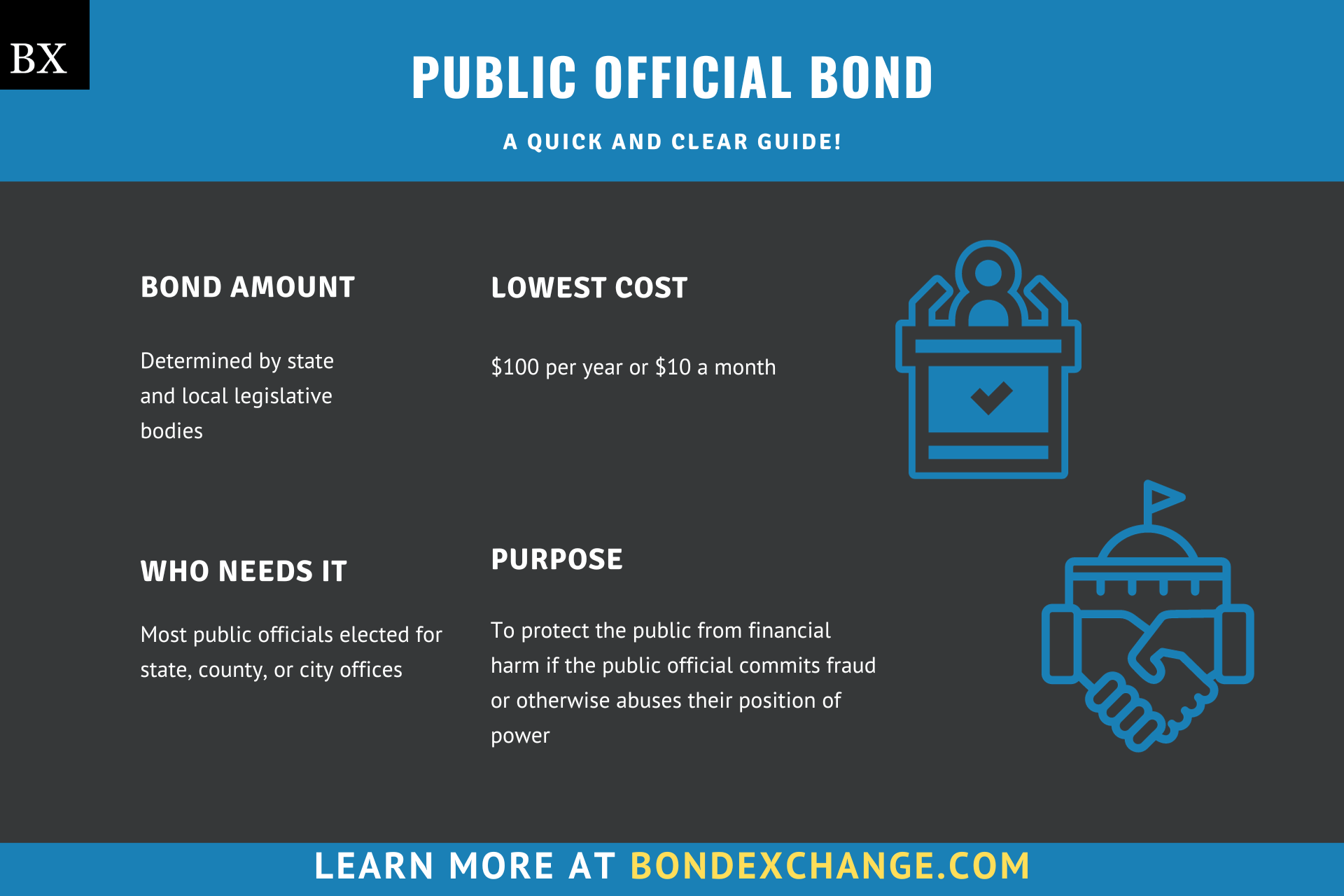Public Official Bond: A Comprehensive Guide For Insurance Agents
This guide provides information for insurance agents to help their customers obtain a Public Official bond.
What Is a Public Official Bond?
A Public Official bond is a government-required surety bond that elected and/or appointed public officials must purchase as a prerequisite to being sworn into state, county, or city office. The duties of public officials vary based on their position in government and the applicable laws surrounding said position. In general, public official bonds obligate the appointed individual to act honestly and faithfully perform the duties of their position. Public Official bonds protect the public from financial harm if the public official violates the terms of their appointment by committing fraud or otherwise abusing their position of power.
Public Official bonds must remain active for as long as the public official’s term of office.
Unlike most insurance products, surety bonds protect a third party (the obligee) from acts that violate the law. When the surety company suffers a loss due to a public official’s actions, the appointee must repay the surety company for such losses, as well as court costs (this is somewhat of a rarity) and other fees.
Who Is Required to Purchase a Public Official Bond?
In most states (around 15), many government positions require a surety bond before they may be sworn in for their elected term. Public Official bonds cover town, city, county, or municipal governments, state government agencies, state/county/city courts, as well as community and state colleges. Below is a general list of elected and/or government-appointed officials that may be required to obtain a Public Official bond:
- Governor
- Mayor
- Attorney General
- State Auditor
- State Treasurer
- Fire Marshall
- Court Clerks
- Sheriff
- Deputy Sheriff
- Constable
- Peace Officer
- Commissioner
- Tax Commissioner
- City Clerks or other City Officials
- Town Clerks or other Town Officials
- County Clerks or other County Officials
- Deputy/Special Game Wardens
- Agents Selling Hunting and Fishing Licenses
- Deputies and employees of Public Officials
Who Regulates Public Official Bonds?
State, county, city, and other municipal government agencies regulate Public Official bonds based on laws written by their legislature. Such governments enforce the law by instituting appointment requirements like educational mandates and a surety bond. The surety bond ensures that the obligee and/or public will be compensated if the public official violates the terms surrounding their appointed/elected position.
How Can an Insurance Agent Obtain a Public Official Bond?
BondExchange makes obtaining a Public Official bond easy. Simply log in to your account and use our keyword search to find the “public official” bond in our database. Don’t have a login? Gain access now and let us help you satisfy your customers’ needs. Our friendly underwriting staff is available by phone at (800) 438-1162, email, or chat from 7:30 AM to 7:00 PM EST to assist you.
At BondExchange, our 40 years of experience, leading technology, and access to markets ensure that we have the knowledge and resources to provide your clients with fast and friendly service whether obtaining quotes or issuing bonds.
Not an agent? Then let us pair you with one!
Click the above image to find a BX Agent near you
Is a Credit Check Required to Purchase a Public Official Bond?
Credit checks are typically not required for most Public Official bonds; however, it is ultimately up to the surety company to determine how it will underwrite and price a surety bond.
How Much Does a Public Official Bond Cost?
In most cases, Public Official bonds cost just $100 per year or $10 per month (BondExchange is the only wholesale surety company to offer monthly subscriptions). However, premium costs can vary if the required bond limit is over $50,000 (this is unlikely). In most cases, rates sit at 0.5% of the bond amount.
What Information Is Collected for a Public Official Bond Application?
Surety company underwriters will collect and review the following information to determine eligibility and rate for a Public Official bond:
- Applicant’s legal name, date of birth (if applicable), address, and phone number
- Years of experience
- Contact phone number
- Applicant’s social security number (if subject to underwriting)
BondExchange now offers monthly pay-as-you-go subscriptions for surety bonds. Your customers are able to purchase their bonds on a monthly basis and cancel them anytime. Learn more here.
How Do Public Officials File Their Bonds?
Surety bond companies will provide the public official with a completed surety bond to be filed with the relevant government agency (typically the office of the Secretary of State) either online when submitting their license applications or by mail.
Surety companies should include the following information on most bond forms:
- Legal name and address of the individual buying the bond
- Surety company’s name, address, and phone number
- Bond amount
- Signatures of the surety representative
- Date the bond is effective and issued
- Corporate seal of the surety company
- Power of Attorney
What Can Public Officials Do to Avoid Claims Against Their Bond?
To avoid claims against their bonds, public officials must follow all state, county, city, or municipal regulations regarding their elected/appointed position, including some of the most critical issues below that tend to cause claims:
- Misrepresentation
- Negligence
- Misfeasance
- Malfeasance
- Fraud
What Other Insurance Products Can Agents Offer Public Official Customers?
Most governing institutions will purchase liability insurance covering losses pertaining to a public official committing fraud, negligence, or misconduct. Bonds are our only business at BondExchange, so we do not issue any other types of insurance, but our agents often utilize brokers for this specific line of business. A list of brokers in this space can be found here.
Which States Require Public Officials to Purchase a Surety Bond?
The following states require public officials to purchase and maintain a surety bond (click on the state for a comprehensive guide on each bond requirement).


